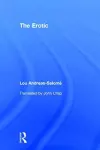
The Erotic
Lou Andreas-Salomé - Hardback
£145.00
Lou Andreas-Salomé (1861-1937) was an influential author and critic and a pioneering psychoanalyst; her writing career spanned nearly five decades. Born and raised in the German expatriate community of St. Petersburg, she studied in Zürich and lived, for most of her life, in Berlin and Göttingen. She made her name with groundbreaking studies of Nietzsche and Ibsen, then concentrated on fiction with a focus on female characters. Her six novels and many novellas and short stories became a beacon for women searching for new ways of living in the patriarchal society of Wilhemine Germany. Andreas-Salomé was also the mentor of Rainer Maria Rilke; she introduced the poet to Russian culture, with profound effects on his work. In her later years, she practiced psychoanalysis, working with Freud and then operating a private practice. Andreas-Salomé is best known for her famous friendships, but the full range of her accomplishments has been charted in more than a dozen biographies in German, French, and English. In 2016, her life was portrayed on the screen by director Cordula Kablitz-Post (Lou Andreas-Salome: The Audacity to Be Free). A uniform edition of her fiction, criticism, and essays is being issued by MedienEdition Welsch in Germany. FRANK BECK is a New York City-based writer and translator. He has written about new poetry for The Manhattan Review for more than 30 years. RALEIGH WHITINGER is emeritus professor of German at the University of Alberta. He has published widely on Theodor Storm, Lou Andreas-Salomé, Goethe, Kleist, and German naturalism. From 2002 to 2011, he edited Seminar: A Journal of Germanic Studies. His translation of Andreas-Salome's novella collection, Menschenkinder, was published as The Human Family in 2005 (University of Nebraska).